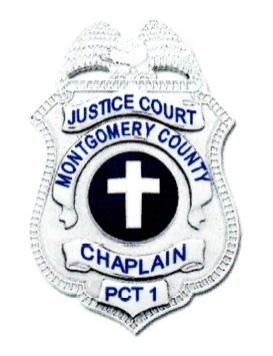 The Freedom From Religion Foundation has received briefing support from Americans United for Separation of Church and State on behalf of 13 well-known historians and legal scholars in its federal lawsuit against a praying Texas judge.
The Freedom From Religion Foundation has received briefing support from Americans United for Separation of Church and State on behalf of 13 well-known historians and legal scholars in its federal lawsuit against a praying Texas judge.
On behalf of “John Roe,” the national state/church watchdog filed suit against Montgomery County Justice of the Peace Wayne Mack for opening each of his court sessions with clergy-led prayer.
FFRF welcomes the amicus brief in support of FFRF and its plaintiff, an attorney who regularly practiced in Mack’s court and objects to the courtroom-prayer practice.
Mack, a formerly ordained minister who attended Jackson College of Ministries, made the unprecedented decision to solicit chaplains to open his court sessions with prayer, a practice not replicated by any other court in the country. Mack’s bailiff announced the prayers, saying that anyone could leave during the prayer, but then locking the courtroom doors. Mack entered, talked about his chaplaincy program, introduced a chaplain, and gave the name and location of the chaplain’s church. While everyone in the courtroom remained standing, the chaplain, who was almost always Christian, delivered a prayer, with no guidelines regarding permissible content. Attendees have reported that Mack has surveyed the courtroom during prayers, causing concern that their cases would be affected if they did not participate.
Mack’s main defense throughout the lawsuit has been that his prayer practice enjoys a long and unbroken history in this country, a claim he has advanced without expert support from a single historian.
The “friend of the court” brief filed by Americans United on behalf of the scholars and historians demonstrates that Mack’s history claim is false. The brief first traces the history of the development of religious freedom in America, citing the views of key founders such as James Madison and Thomas Jefferson, noting that the Establishment Clause was intended in part to prevent governmental religious coercion.
The historians’ brief then picks apart Mack’s dubious claim of historical legitimacy. “Proper historical analysis reveals that there was no long, unbroken, or established history of courtroom prayer in the United States,” the brief asserts. “Instead, it shows that courtroom prayer is not consistent with the purpose of the Establishment Clause, would not have been supported by the Founders whose ideas the Establishment Clause reflects, and was rare around the time of the ratification of the First Amendment.”
FFRF and Attorney Roe, the plaintiffs in the lawsuit, previously dispatched Mack’s bogus history argument when they won their case in district court. In May 2021, U.S. District Judge Kenneth M. Hoyt ruled in favor of the plaintiffs, writing: “The court is of the view that the defendant violates the Establishment Clause when, before a captured audience of litigants and their counsel, he presents himself as theopneustically inspired, enabling him to advance, through the chaplaincy program, God’s ‘larger purpose.’ Such a magnanimous goal flies in the face of historical tradition, and makes a mockery of both religion and law.”
A second amicus brief, filed in support of plaintiffs by the nonprofit Institute for Justice and the Foundation for Individual Rights in Education, argues that a panel of judges on the U.S. 5th Circuit Court of Appeals misstated the law in holding that lawsuits against state officials (such as Mack) cannot arise under 42 U.S.C. § 1983 and must instead be brought as an equitable cause of action recognized in Ex Parte Young. While this highly technical issue was not raised by the parties on appeal, and did not need to be resolved in order to adjudicate the issues on appeal, Judge Andrew Oldham, a Trump appointee, nevertheless advanced this novel and unprecedented interpretation of the law in his written opinion. IJ and FIRE urge the 5th Circuit to address and overturn this incorrect holding when resolving the case on the merits.
“We’re grateful for the support of these groups, historians and legal scholars in documenting the truth — that courtroom prayer cannot be excused as a historic practice,” says FFRF Co-President Annie Laurie Gaylor. “Mack’s conduct is coercive, inappropriate, ill-mannered and unconstitutional.”
The case is now on appeal before the 5th Circuit. FFRF and Roe are represented by FFRF Associate Counsel Sam Grover, with Attorney Ayesha Khan of Washington, D.C., serving as co-counsel.
The Freedom From Religion Foundation is a national association with more than 35,000 members, including more than 1,500 members and a chapter in Texas, and works as a state/church watchdog.

